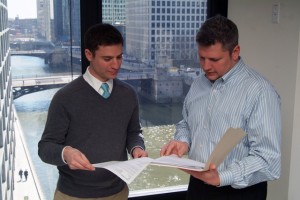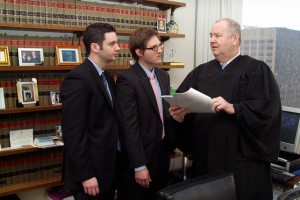Opportunities to clerk for a judge and intern at a national business are part of the educational offerings at The John Marshall Law School.
Internships, externships, clinical experiences and clerkships are available to students each semester.
“We encourage students to find time in their schedules for internships because they offer valuable experience in the practice of law, and they are an excellent way to start networking,” said Assistant Dean Laurel Hajek, director of Career Services.
Clinical Professor Susann MacLachlan also offers students opportunities at externships for law school credit with judges, government agencies, not-for-profits and businesses.
“I receive excellent feedback from students who have taken the time to extern in a courtroom placement through the judicial externship program,” she explained. “Besides the networking opportunities available to them, students are exposed to the inner-workings of judicial chambers and have the chance to observe the law in action, from the courts perspective. But externships at any of our available placements are a benefit to these students.”

Barry Kanarek (left) reviewed a project with his legal department supervisor, Stephen Trimper, at Chicago Mercantile Exchange (CME). Kanarek, a third-year student, completed his externship in spring 2011, and has continued working at CME.
And third-year student Barry Kanarek is one of the students who found his spring 2011 semester externship with the legal department at the Chicago Mercantile Exchange (CME) invaluable. It also resulted in his being hired on for summer employment that has continued at CME this semester.
Kanarek said he wanted an externship because it was “extremely important to get first-hand experience and see what happens on a day-to-day basis. An externship allows you to learn how your certain field operates and gives you insight that you cannot achieve by sitting in a classroom.”
And Kanarek found that being mentored by someone already in the profession with years of experience was a great benefit. “Stephen Trimper (LLM ’95), who is my supervisor, is always willing to answer questions and help me understand the inner workings of CME and their legal transactions.
“My externship at CME was great. It taught me not only securities law but also business acumen and how the corporate world works,” he said. “One of my projects was examining gross negligence and negligence cases. Because of my Lawyering Skills classes, I was able to recognize the different complex issues and write a clear and concise legal analysis explaining the case law and issues that were involved.”

Circuit Court of Cook County Judge James P. Flannery stressed one of the finer points of a case when he met with Alex Turner (left) and Scott Duxbury (center) during their spring 2011 semester externship.
Scott Duxbury spent a semester working at the Daley Center with Circuit Court of Cook County Judge James P. Flannery Jr. (JD ’76) in the Law Division.
“From the outset of my externship, Judge Flannery became more of a mentor and educator than I ever anticipated,” Duxbury said. He was given an opportunity to observe the judge’s work ethic and judicial methodology. “Most of all, Judge Flannery took a sincere interest in my best interests not only as an extern, but as an individual.”
Duxbury, a third-year student, said the externship was educational, and emphasized a “student-teacher relationship more so than employer-employee. I wanted ‘work’ experience that would absolutely enhance my understanding of the law. Being in court gave me new insights into the roles of the attorneys and the judge.
“I also realize that my Lawyering Skills and other classes are going to be beneficial to me after graduation,” he added. “After having observed attorneys of varying experience and skill, and understanding the attention to detail and time needed for quality legal writing and trial practice, I have learned that a successful lawyer is someone who excels at the small things. Clear and concise motions, timely objections, having relevant case law on hand, even extra eye-contact during closing: these are matters of preparation and efficiency that John Marshall preaches, and that separate mediocre lawyers from good ones.”
Duxbury said his semester in the judge’s courtroom “helped me understand the level of professionalism required for quality lawyering. A consistent theme throughout our classroom component and my time spent in court was the necessary balance between zealous advocacy and cooperation with opposing counsel. There is no better manner of grasping this relationship than observing trials from the unique perspective of a judicial extern.”
Students interested in learning about externships for law school credit can contact MacLachlan at her office, Room 415 in the State Street building, and for internship and clerkship information visit the Career Services Office.
